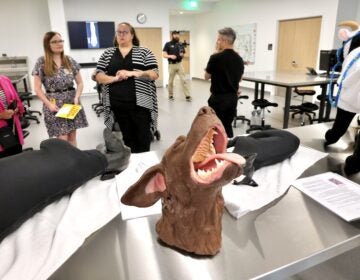Philly district orders school police to stay out of level 1 offenses
Philadelphia School District has directed school police officers to stop responding to calls related to Level 1 student conduct offenses. The proscribed violations range from “failure to follow classroom rules” to “truancy” to “verbal altercations” to “inappropriate touching/public displays of affection.”
“These infractions are not criminal offenses; they are classroom/student management issues,” wrote District Chief Inspector Carl W. Holmes to school administrators and school police in a memo dated March 10, 2014.
The memo states that school police should “respond to all calls that are criminal in nature, or where persons involved are violent or threatening.”
In the event of other incidents, officers should “request the presence of an administrator, counselor, or administrative designee.”
(“Inappropriate touching” does not include non-consensual sexual acts, which is a separate Level 2 offense).
The School district’s chief of student services, Karyn Lynch, characterized the policy shift as a “part of a complement of changes” designed to ensure safer schools and build better school culture.
“It’s all part of the effort to ensure that students aren’t over-arrested,” Lynch said, “and really this is an effort to try and assign to individuals what their duties and responsibilities and their skill set is best related to.”
Lynch said this change goes hand-in-hand with other district imperatives including its implementation of the Response to Instruction and Intervention Initiative.
In line with that program, all teachers hired last year went through a conflict resolution program that focuses on social and emotional learning (CRETE) developed by Temple University’s College of Education.
The district has also began offering behavioral management and behavioral health training to all staff in order to improve “their ability to engage with students,” said Lynch, and better understand “why students sometimes have the reactions that they have within a school.”
Social justice education advocates praised the district’s decision to put this policy in writing. Too often, they say, students are arrested or expelled for minor offenses that then negatively affect their chances of graduation.
“Schools should not be using police as school disciplinarians,” said Deborah Klehr, senior staff attorney at Pennsylvania’s Education Law Center.
Klehr says disciplinary offenses should be confronted through more positive and therapeutic “restorative practice” measures. That can include school-wide support of positive behavior and a greater reliance on guidance counselors.
“Not calling the police or not expelling kids or not arresting kids doesn’t mean ‘permissiveness,'” Klehr said. “Good schools will react, but they’ll also have a lot of prevention involved.”
Nationally, statistics show that schools disproportionately suspend and expel African-American students and those with disabilities. Last week, the Civil Rights Data Center released a report that showed that this disparity appears as early as preschool.
Advocates such as Klehr believe that policies that bar school police from engaging in non-violent incidents will help end the so-called “school-to-prison pipeline.” The American Federation of Teachers and the National Education Association both have pushed for these reforms.
Chief inspector Holmes further reasons that this policy change will prevent Level 1 offenses from escalating into something more violent.
“Numerous incidents of assaults on school police officers and staff occur as a direct result of the officers’ intervention into non-criminal student/classroom management issues.”
Teachers’ view
Some Philadelphia teachers, though, worry the change will actually put more students and teachers in harms way.
In a letter responding to the district’s official memo one teacher at a comprehensive neighborhood high school (who wished to remain anonymous) wrote:
“It would seem Mr. Holmes believes that, until fists are thrown and blood is shed, it is a simple matter of classroom management…as members of a school community it is beholden on all of the adults to wear multiple hats to maintain a safe learning environment.”
The teacher who authored this letter only learned of the policy change when a school police officer declined to assist a colleague who had requested help with a student committing a Level 1 offense.
Philadelphia Federation of Teachers president Jerry Jordan said he’s “very concerned” about the rule change.
“The district chose to get rid of non-teaching assistants, and as a result of it, they’re asking other people to do the jobs that non-teaching assistants did,” said Jordan, who stressed that school counselors should not be used as first-responders when incidents break-out.
An incident at Bartram High School that happened last Friday left a PFT member with a fractured skull.
A recently formed faction of the PFT, The Caucus of Working Educators, also questioned the district’s rationale – especially given the lack of resources found in schools this year.
“It is easy…to say that someone else should deal with it. There is no ‘someone else,'” said Amy Roat, member of the caucus’ steering committee, and teacher at Feltonville School of Arts and Sciences.
“We don’t have anyone in our building most of the time that is ‘qualified’ to deal with these issues,” she said. “We all just have to jump in and deal with it.”
Feltonville shares one school counselor with another school. Between the two, the counselor is responsible for 1,300 students.
In Roat’s experience, the school police officer doesn’t spark violent incidents, but often helps to de-escalate and pre-empt them.
“Our school police officer is throwing cold water on everything. His appearance and his presence is very calming for everybody,” she said.
“People don’t usually start with a Level 2 offense. Usually it starts with people being disruptive, being verbal, not sitting down, and then it turns to someone else,” Roat continued. “So in a school setting I just think it’s very awkward to draw the line and say, ‘he can’t be called for this.'”
Klehr, at the Education Law Center, sympathized with the teachers’ perspective, but said those are concerns that should be addressed by increasing funding to Philadelphia schools which would add more support staff to buildings.
“I’m sensitive to the teachers frustration feeling that there’s this lack of resources – they don’t have enough guidance counselors,” Klehr said. “But we can’t arrest our way out of this resource problem.”
Given the fact that the district needs $200 million just to start school next year with this year’s dismal level of resources, teachers are not expecting to receive any additional help.
Below is a transcript of the beginning of the district’s memo:
Effectively immediately, School Police Officers will not respond to, or remove students from classrooms, cafeterias, restrooms, etc., for calls pertaining to the following Level 1 Code of Conduct offenses:
Failure to follow classroom rules/disruptionDress code violationFailure to carry hall-pass/appropriate IDFailure to participate in class/unpreparednessTruancy/excessive tardiness/cutting classPossession of beepers/pagers/cell phones/other electronic devicesPossession of other inappropriate personal itemsPublic display of affection/inappropriate touchingInappropriate use of electronic devicesVerbal altercations
WHYY is your source for fact-based, in-depth journalism and information. As a nonprofit organization, we rely on financial support from readers like you. Please give today.





